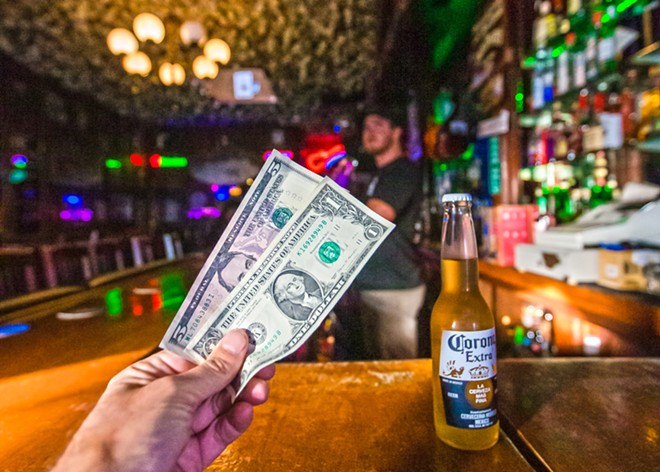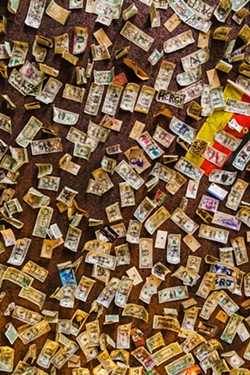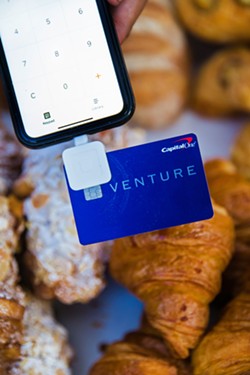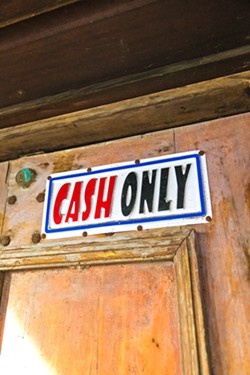'Cash only': It's easier now than ever to swipe cards, but for a select few stubborn SLO County businesses, cash stands for more than just convenience
By Kasey Bubnash[{
"name": "Ad - Medium Rectangle CC01 - 300x250",
"id": "AdMediumRectangleCC01300x250",
"class": "inlineCenter",
"insertPoint": "8",
"component": "2963441",
"requiredCountToDisplay": "12"
},{
"name": "Ad - Medium Rectangle LC01 - 300x250",
"id": "AdMediumRectangleCC01300x250",
"class": "inlineCenter",
"insertPoint": "18",
"component": "2963441",
"requiredCountToDisplay": "22"
},{
"name": "Ad - Medium Rectangle LC09 - 300x250",
"id": "AdMediumRectangleLC09300x250",
"class": "inlineCenter",
"insertPoint": "28",
"component": "3252660",
"requiredCountToDisplay": "32"
}]
Walking into a bar like the Pine Street Saloon feels a little like traveling back in time.
The stale smell of beer-stained floors; the antique beer mirrors advertising Acme and other brands of a bygone era; the photos and paintings of Wild West cowboys and gold miners hung in ornate frames and covering nearly every inch of wall space. The classic black leather bar stools, cigarette vending machine, and even the building itself—a two-story Western false front built of redwood in the mid-1800s.
All these little details come together to give the saloon its air of safety, of being unscathed by time. You get the feeling that, unlike in the rest of the world, things here aren't changing, and throughout the nearly 50 years since the Paso Robles staple first opened its doors in 1971, not a whole lot has.
So it's no big surprise that the Pine Street Saloon is one of the few remaining businesses in San Luis Obispo County still taking cold, hard cash only.
"People come to me all the time about credit cards," owner Ron French says while sitting in the near empty bar on a weekday afternoon in December. "But the answer is, 'No.' I'll never do it. Not as long as there's cash out there."
In an era of constantly developing technology, it's easier than ever for consumers to buy and businesses to sell. The advent of online banking has made it possible to manage entire bank accounts with the touch of a finger, apps like Venmo allow for quick and easy digital transfers of money, and mobile card readers like Square have given anyone with a smartphone the ability to accept credit and debit cards wherever they are.
To snub all that and reject the credit and debit cards that are so popular in today's digital world seems counterintuitive.
But for a select few stubborn business owners in SLO County, it doesn't matter how "convenient" cards are for customers or how unfamiliar younger generations become with physical money. It doesn't matter how many potential customers are lost or how out of date the idea of a cash-only business may seem.
In retro spots like the Sunset Drive-In, the Old Cayucos Tavern, and here in the Pine Street Saloon, cash rules everything. It's about more than just avoiding the processing fees and identity theft that come with cards. It's a lifestyle, and one that French says can be summed up in one simple sentence: "If you don't have cash, you don't need to be here."
Weighing the options
At a little before 4 p.m. on a Wednesday, the Pine Street Saloon is dead. A pool table toward the back of the bar sits unused, the jukebox is silent, and the bar's tiny stage is empty. A few regulars are at the bar, chatting up the bartender as French settles into a seat at a high-top table near the center of the room.
It's slow now, French says, but on Fridays and Saturdays, hoards of out-of-towners and SLO County residents descend on the bar, crowding together for the low-cost drinks, live bands, and karaoke. Most weekends, the bar has standing room only inside and out on the spacious back patio, so French says he's not too worried about losing a few customers over his refusal to accept credit and debit cards and checks.
"I'm far from not busy," he says.
Pine Street has been a cash-only business since French's mother opened it as the Red Door in the '70s, and although its name and location have changed since then, the cash philosophy hasn't. And it won't anytime soon.
French tried taking cards for a few weeks sometime in the '80s or '90s, and the pilot program didn't go well. It slowed things down, he says, jammed up the system.
"If you're a busy place," he says, "it takes a lot of time to run up all these things."
You have to swipe the card, wait for the transaction to be approved, wait for a receipt to print, bring the card and receipt back to the customer, get a signature, and then file the signed receipt away—all time that, as far as French is concerned, would be better spent making drinks.
And it wasn't just that, he says.
A few customers came in with cards, started tabs, bought dozens of drinks, and then left without paying and couldn't be traced. Others bought too many drinks and, for some strange reason, didn't remember spending as much as they had, and tried to fight the charges.
French says he didn't like being chewed out in the cold light of day, and he didn't like seeing people spend money they didn't have. So he nixed the cards for good right then and there.
But as cards became more popular over the years, he started to get complaints. So about 10 years ago, he bought an ATM and had it installed near the front entrance of the bar. It was a bit of an investment, he says—he had to pay for the machine, for its installation, and hire programmers and a maintenance team—but now it's an additional source of revenue.
Though he won't specify just how much the ATM brings in annually, he says he charges $1.95 for every withdrawal—the same fee he's charged for years—and it gets plenty of use. But even the ATM, which allows only $200 to be withdrawn from a single account each night, is in line with French's anti-overspending policy.
Still, French admits that even cash has its downsides. Tax season is time consuming, counterfeit bills have become increasingly common, and robberies are always a concern.
But it's worth it, he says. He doesn't use cards, and he doesn't want his customers to have to either.
"I practice what I preach," he says.
These are factors all business owners have to consider when deciding whether they'll accept credit and debit cards, according to Jim Dantona, president of the San Luis Obispo Chamber of Commerce.
Cash certainly has its downsides, Dantona agreed, and any business that rejects cards is on some level accepting the loss of some, or possibly many, potential customers. People don't carry a lot of paper money around anymore, and Dantona said most don't want to have to go pay a $5 ATM fee just to get a drink of the same price.
But with the ever-present threats of identity theft, cyber security breaches, and data hacking, he said physical bills do have their benefits.
When a business takes cards, it also takes on the responsibility of keeping its customers' financial data secure. It's crucial that businesses stay up to date on current data privacy rules, Dantona said, and if a breach were to occur, it could be a major liability.
If a stolen card is used at a business, Dantona said those charges are disputed directly between the vendor and card company, and it's not unusual for the card company to come out on top.
"Cash," on the other hand, he told New Times, "is hard to fake."
Credit and debit card companies like Visa and Mastercard also charge businesses a processing fee with every swipe. The fees, Dantona said, run anywhere from about 1.5 to 3.5 percent of each purchase, with most companies keeping their charges on the lower side of the spectrum. The higher the business's volume of profits, the better the processing rates, and the more manageable those charges become.
"So if your margins are super thin on what you're selling," Dantona told New Times, "it may not be cost effective for you to utilize credit cards."
Times they are a-changin'
In downtown San Luis Obispo, where $12 drinks are as easy to find as belligerent college students, McCarthy's Irish Pub acts as a kind of haven for SLO's older generations.
Situated toward the southernmost edge of downtown and only a street off the main strip, McCarthy's is just far enough out of reach to remain hidden from the shoulder-to-shoulder crowds and blaring electronic music that are so common to the bars on Higuera.
It's one of the few places downtown where a conversation can be had and actually heard, and with its low lighting and customer base of patio-dwelling smokers, McCarthy's could even be described as "divey." So it would only make sense for McCarthy's, a bar that has rejected the norms of downtown San Luis Obispo, to also rebuff credit and debit cards.
But even many of the dingiest, most individualistic bars take cards today, and McCarthy's does too. Owner Ron Meier said that's how it's been for more than a decade.
"People like the convenience of not carrying cash," Meier told New Times.
That's an understatement. It's estimated that roughly 80 percent of all U.S. adults have at least one credit card, according to a report published by the Federal Reserve in May 2019. Only about 6 percent of Americans are living without some form of checking, savings, or money market account, according to the report, reaching one of the lowest levels in history.
With this shift away from cash, even farmers' markets, where vendors have historically championed cash sales, are working to accommodate a new generation of customers.
Roughly 60 percent of vendors outside the certified farmers section of SLO's Thursday night market accept some form of payment other than cash, from Venmo and PayPal to credit cards, according to market manager Whitney Chaney.
SLO County farmer Jeff Nielsen has noticed similar changes at the markets he works, as well.
Nielsen manages and sells at a number of the county's farmers' markets, including in Morro Bay, Cambria, and at Farm Supply in San Luis Obispo. Over the years, he's watched as farmers' markets and their vendors have developed to meet the digital demands of customers.
A lot of market managers and associations run "market bucks" programs, Nielsen said, where customers without cash can run their cards, pay a small withdrawal fee, and obtain tokens to spend at the market. Once the market closes, vendors exchange their tokens for cash.
It's always sad to turn potential customers away just because they don't have paper money, Nielsen said, and the market bucks program offers an easy solution to that problem.
But most sellers are already taking matters into their own hands.
Like many modern-day business owners, Nielsen uses Square, an inexpensive and mobile card reader that plugs into smartphones and tablets and can be used essentially anywhere with cell service. Products like Square have revolutionized the business industry, making it possible for almost anyone to accept cards, without investing in much infrastructure, and unlocking a whole new customer base for sellers who, in the recent past, would have been limited to those few buyers carrying cash.
Of course, Square comes with its downsides. The company charges a flat processing rate of a little more than 2.6 percent per swipe, a somewhat steep rate compared to what most credit card companies charge. Nielsen said he just eats the cost himself, but those processing fees can be challenging for small-scale vendors to swallow.
"I noticed a few years ago that vendors with high-value products tend to take Square or some card processing product," he told New Times. "Most who don't are farmers, and they don't want to deal with it."
While Nielsen himself is comfortable using technology to his advantage, he said a lot of the local farmers he works with are old-school. Some don't even have cell phones, he said, and many have had the same selling routine for years. They don't want some "piece of plastic" ruining their method of operation.
One local vendor Nielsen knows was particularly set in her ways. She'd gone years without even considering any form of payment other than cash, so Nielsen was shocked when he walked past her stand one day and she was suddenly swiping cards. She informed him that her 20-something daughter got involved in the business, found out she wasn't taking cards, and said, "You're not taking credit cards? This is like losing money!"
Here's to simplicity
Andrea Lillian owns the Old Cayucos Tavern, and she doesn't really care if her cash-only policy loses her profits or potential customers. In fact, she already knows it does. The Tavern doesn't even have an ATM, and Lillian said some people get "all bent out of shape" about it.
Too bad, she said.
"No checks! No tabs! No nothin'," she told New Times. "If you don't have cash to back up whatever you're purchasing, hit the bricks."
To her, cash isn't just about avoiding the credit card processing fees or fraud, although that's definitely part of it. It's a way of life, and one that's rooted in her belief that people have a right to privacy—a notion further illustrated by her request that we use only her first and middle name for this article.
Lillian has her own set of practical reasons for avoiding cards, too. Cards "gum up the works," she said, slowing the purchasing process to a degree she just can't stand. She doesn't like having to chase customers down for a signature and then having to keep track of the receipts. Like French of Pine Street Tavern, Lillian tried taking cards once decades ago and had problems with theft, fraud, and unpaid bills.
But most of all, Lillian doesn't like what credit cards do to people, that they allow, and even incentivize, spending outside one's means. Or that every little purchase is recorded and tracked in detail.
"Forget about it," Lillian said. "A fresh $100 bill will be fine for me. Or at least a 20."
Paper money, she said, is almost patriotic. It's real. It's tangible. What you see is what you get.
That aligns perfectly with the character of her bar. Like cash, the Old Cayucos Tavern has a lived-in feel, as if it's seen things we haven't. It's uncomplicated and a little antiquated, but that's precisely what makes it so alluring.
"I just feel like it kind of brings people back into their element of living in a time where things were simpler," Lillian said.
And that's what she loves about cash, too. Δ
Contact Staff Writer Kasey Bubnash at [email protected].
Latest in News
Comments
Showing 1-1 of 1
Readers also liked…
-

Coast Unified teachers upset over new position's salary and qualifications
Oct 20, 2022 -

SLO police identify alleged driver who hit and killed couple
Dec 22, 2022 -

When the levee breaks: Oceano residents, county officials walk a tightrope of regulations to manage Arroyo Grande Creek, which some say led to the levee's failure in January
May 18, 2023













